Trilingual education
Trinity of languages at M.Auezov South Kazakhstan State University
About trinity of languages in Kazakhstan President N.A.Nazarbayev has repeatedly said in various official statements. This idea was first announced on October 2006 at the XII session of the Assembly of Kazakhstan’s People, the head of the State noted that the knowledge of at least three languages is important for the future of our children.
In the Message of 2007 “New Kazakhstan in the new world”,NursultanNazarbayev proposed to begin a phased implementation of the cultural project “Trinity of languages”. “Kazakhstan should be perceived worldwide as a highly educated country whose population uses three languages. They are: Kazakh language - the state language, Russian language - as a language of international communication and English - the language of successful integration into the global economy”, - said the President.
With the direct participation of the basic HEIsby the Ministry of Education and Science of the Republic of Kazakhstan, in 2012 was developed the Concept of trilingual education, in which the analysis of the conditions and possibilities of the modern education system is given for the implementation of the ideas of trinity of languages and identified priority areas for the development of multilingual education. This implies, first of all, the revision of the content of modern language education as a whole, which will require developing a package of documents determining the strategy and tactics for learning languages in the education system of the Republic of Kazakhstan.
On May 6, 2015 the President, making an announcement at an enlarged Government’s meeting in Astana “Nation’s Plan -100 concrete steps to implement the five institutional reforms” outlined the importance of a gradual transition to English in the education system;the main objective is to increase competitiveness of future specialists and growth of export potential of education sector.
Creating an effective polylingual environment in universities is one of the main factors of competitiveness of the education system, the entry of our country in the 30 developed countries of the world and a condition for the promotion of the Bologna initiatives, in particular academic mobility and the implementation of joint study programs.
Realization of the program provides students and lecturers access to quality education, to the best foreign educational resources and technologies, development of professional competence and the competitiveness of professionals and obtaining two diploma education.
To date, M.Auezov South Kazakhstan State University is one of the first universities where successfully implemented trilingual educationfrom 2004-2005 academic year.
On the decision of the Academic Council of M.Auezov SKSU in 2005 was established the Linguistic centerfor the implementation of multilingual education policy.
In the same academic year, in the Linguistic center were organizedfree-of-charge English language courses for the teaching staff of the University. Wishing to take English language courses for free were 37 teachers and lecturers. Among them, in the test mode 9 teachers began to teach general subjects in English on 7 specialties of the University.
In the 2006-2007 academic year 87 teachers received certificates of English language, but 36 of them received the necessary level to conductthe lessons in English. That academic year on the specialties of: 050606 – Chemistry, 050701 - Biotechnology, 050720 - Chemical technology of inorganic substances, 050720 - CTIS (specialization) Chemical technology of refractory non-metallic and silicate materials, 050721 - Chemical technology of organic substances, 050727 - Technology of food products, 050728 - Technology of processing industries were formed special groups with training of a number of disciplines in English language.
Today, 108 teachers, conducting their subjects in a foreign language passed additional English language courses from Pre-Intermediate to Intermediate level, and 8 teachers are learning English at Upper-Intermediate level.
For the 2009-2010 academic year more than 6 facultiesorganized training in English on 19 specialties. 62 special English groups were formed with 424 students studying 163 subjects in English, taught by 68 teachers.
Every year there is a tendency to increase the number of students in the English special groups. The reason was due to the fact that students' interest in English was increasing; students have more opportunities for successful employment, job opportunities in foreign companies not only in the CIS countries, but also abroad.
By the 2010-2011 academicyear 6 faculties organized trilingual education on 25 Bachelor programs. The number of English special groups exceeded 68 out of 476 students. 76 teacherstaught 154 subjectsinEnglish.
In 2009 on the basis of the acquired experience on trilingual education the Programme of multilingual education development was developed. The programmeis addressedto the solution of identified objectives and problems of multilingual education; and creates organizational conditions for the implementation of multilingual education in M.Auezov SKSUon 4 directions: academic and organizational support, scientific and methodical support, theoretical and methodological support, logistical support for multilingual education in M.Auezov SKSU.
In the current academic year, training is conducted in English at 9 faculties and 27 educational programs of undergraduate and 3 graduate educational programs are involved in 70 English groups with 648 students and 34 master students.
115 teaching staff is involved in delivering of 378 subjects in English. Coverage of English subjects reaches on average 51.2% of the total subjects.
All subjects taught in English are fully supplied with teaching and methodical literature. Last three years, teaching staff of the University have developed 202 - methodical guidelines, 3 - monographs, 33 - collections of cases, 32 - role-playing games, 43 - lecture notes, 39 - training and teaching aids, and 8 –textbooks in foreign language.
In 2012, for the organization and control of the educational process in foreign languages, by the decision of the Rector of M.Auezov SKSU was created the Division oforganization and control of quality assurance for training in foreign languages at the Teaching-Methodical department, now the Department of Academic Affairs.
The main tasks and functions of the division are: a) organization and control of quality assurance for teaching subjects in foreign languages; b) organization and coordination of the work of faculties, divisions and other structural units to ensure the qualityof the educational process in foreign languages; c) documentation and preparation of report data on students’ contingent and organization of academic process in foreign languages at the university; d) organization and holding the interviews with teaching staff of the university for defining their readiness to teaching in foreign languages; e) organization of activities for improving foreign language level of teaching stuff and students.
Training in English for Master education programs are conducted in three specialties. Specialty 6M060800-Ecology training in English is conducted from 2014-2015 academic year. On educational programs of 6M072000-Cemical technology of inorganic substances, 6M072800- Technology of processing industries were organized on the framework of the preparation of specialists for the SPIID-2 started teaching in English language training from the 2015-2016 academic year.
Organization of educational process in English on Master educational programs creates conditions for increasing the human resource capacity of the educational process in English, and the growth of their attractiveness. Thus, in many foreign universities learning in foreign language is organized in all master and doctoral educational programs, which enhances the status of the institution in the global educational arena.
The following departments involved in creation of conditions for the implementation of trilingual education in the University:
• The Department of Academic Affairs: Division of organization and control of quality assurance for training in foreign languages; Methodical division; Accreditation division;
• Division of languages development;
• Center for International Cooperation;
• Faculties / Higher Schools / Post-graduate education center;
• Center of Bologna process and academic mobility;
• “Abay studies” scientific center;
• Chair of teaching the state language;
• Chair of English Linguistics;
• Chair of Kazakh language and literature;
• Chair of Russian Language and Literature;
• Chair of Foreign Languages for engineering specialties;
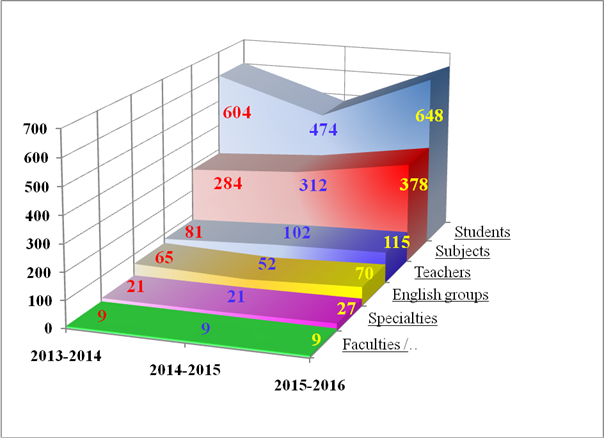
Widening the range of educational opportunities and ways of teaching for the development of multilingual education on priority specialties provides increasing of the number of teaching staffto 2020 –up to 120, the number of specialties - up to 35, the number of groups - up to 75, the number of students –up to 700, the number of subjects–up to 400.
It is necessary to mention the specifics of groups in the Faculty of Philology: 1) Foreign language: two foreign languages; 2) Translation Studies; 3) Foreign philology: English language. The groupsof these specialties are polylingual, since basic training in these groups is in English and general subjects are studied in studying language, and in the second language are studied: Kazakh / Russian language, Practical Kazakh / Russian language and Office work in state language. Fromthe new academic year, subject ofInformation and communication technology will be studied in English in all specialties of the University.
It should be noted that Multilinguism provides the university with 0the opportunity to effectively implement the principles of the Bologna process and integrate into the international educational space.
Educational programs implemented in the English language, are more attractive to students in the following terms of:
- Linguistic competence and inter-ethnic communication;
- Participation in academic mobility programs and double diploma education;
- Training on accredited educational programs;
- Obtaining international labels for the recognition in the labor market;
- Employment in international and national companies, and opportunities for career growth.
Professional development of University teachers, conducting their subjects in English are organized with foreign partner universities, and are developing in collaboration with the Division of Professional development and the Academic mobility and International rankings center. International internships are organized to improve the skills in foreign partner universities from Europe, Malaysia and Turkey.
In order to promote the academic mobility of SKSU’steachersa pilot project “Global Internship” is organized. The program is one of the strategic initiatives of the internationalization of education in M.Auezov SKSU, ensuring the passage of professional language training and lecturing of teachers, leading classes in English.
In the framework of the project program is planned to implement several tasks:
• language training;
• establishment of contacts with foreign universities;
• delivering lectures and others.
During the period of the proposed action of the program, from 2015 to 2020 year, it is planned to involve about 100 teachers. The project is financed from extra-budgetary resources of the University.
Today,5 teacherswere trained abroadon “Global Internship” program, they are:
1. Associate Professor of the chair "Information Systems" UmarovaJanat - University Putra Malaysia (Serdang, Selangor, Malaysia).
2. Associate Professor of the chair "Life safety and environmental protection" ZhylysbayevaAkkonyr at the Polytechnical University of Valencia (Spain).
3. Senior lecturer of the chair "Computers and Software" NyshanbayevaZhanar - University Putra Malaysia (Serdang, Selangor, Malaysia).
4. Head of the chair "Accounting and Auditing" ZhakipbekovDinmuhamed at the University of Turiba (Latvia).
5. Senior lecturer of the chair "International Relations and Political Science" TurekulovaZhulduz in the Lodz University (Poland).
In 2016, also planned a target group of 20 teaching staff conducting classes in English.
The Division of Professional development of the scientific-pedagogical staff conducts the selection and organization of teacher training programson the Program of “Orleu”. Today, 6 teachers have been trained in foreign universities of Europe, Portugal, Spain, Germany, England and Japan. It is planned to send another 10 teachers.
Department «English Linguistics»
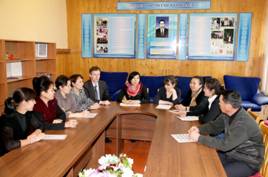
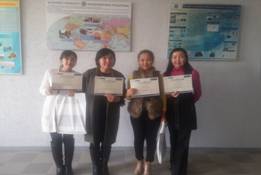
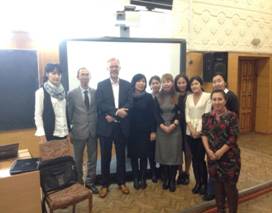
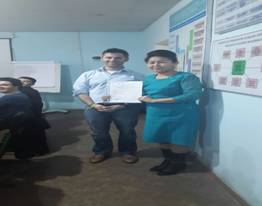
«Three unity of languages – top of knowledge
One of the most important issues in the period of globalization of the Republic of Kazakhstan – the trilingual. In the new academic year, students of initial classes of all schools in the country will be trained in Kazakh and Russian languages, including English. In this area South Kazakhstan State University by M.Auezov prepares qualified specialists at the Faculty of Philology, department of English Linguistics. At the Department of English Linguistics there are three specialties: 5B011900 - Foreign language: two foreign languages, 5B021000 - Foreign philology, 5B020700 - Translation Studies.
The head of the department is the specialist of German and English languages, candidate of philological sciences, associate professor G.K.Karbozova. She has proved her high competence in the field of linguistics and in innovative methods in teaching foreign languages in the 2015-2016 academic year, she will go to improve the skills to the countries of Europe: teaching activities on the program Erasmus + K107 in Spain and grant the Goethe Institute in Germany, the training on methodology of teaching foreign languages.
Candidate of philological sciences, associate professor G.K.Zhumagulova and teacher M.Қaldybekқyzy trained in business school, Montreux (Switzerland) on the presidential program «Bolashak» (15.07.2013 - 23.09.2013). In the frame of this program G.K.Karbozova developed her qualification in Cambridge University.
Senior Lecturer Halmirzaeva Kulanda Serikovna participated in the seminar «Schreibförderungen im DaF-Unterricht» in the Uzbek State University of World Languages with the DAAD (01.12.2015 - 05.12.2015). (German InterAcademy communication cooperation). She got an international certificate.
In accordance with the agreement between universities, professors and teachers of language teaching of Great Britain, China, Germany, Spain are invited. Students of the department on academic mobility are studying at the United States, England, Germany, Spain, Poland, Latvia, Romania. Our students speak several languages: their mother tongue, language of communication Russian, English, German, Chinese, and other. Our teachers and students are involved as an interpreter at all international meetings and conferences taking place in the South Kazakhstan and University.
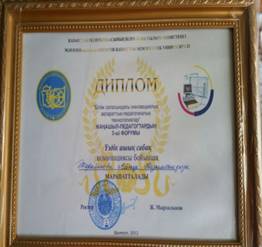
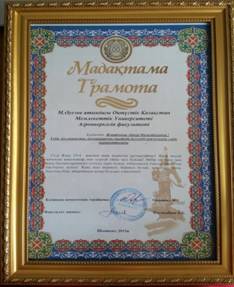
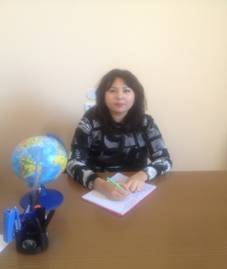
Competent specialist
23.02.16. The head of the department «Foreign languages for humanitarian languages» A.N. Zhorabekova received a degree of Philosophy Doctor on specialty 6D010300 «Pedagogy and Psychology». Since January 2016 A.N. Zhorabekova has headed the department "Foreign languages for humanitarian specialties". Her organizational skills have led to the successfully heading of the department. The purpose of her life is development of intelligence and work on herself. She perfectly learned Russian, Kazakh, English and Uzbek languages, German and Persian languages on the conversation level. The principles of her life are to achieve the objectives and responsiveness.
In 1999, A.N. Zhorabekova graduated from M. Ulugbek Tashkent State University, on specialty «International journalism». In 2006 she received a diploma on speciality "Foreign languages: two foreign languages» in Shymkent socio-pedagogical university.
In April 2012, A.N. Zhorabekova received a diploma by nomination "The best demonstrative lesson" at the 3rd forum of Teachers-innovators "Innovative information technology and training in the field of education", organized by the Ministry of Education and Science of the Republic of Kazakhstan in M.Auezov South Kazakhstan State University.
In agroindustrial faculty A.N. Zhorabekova was awarded by diploma "Best Senior Lecturer" for active participation in the competition study of innovative teaching.
In 2013, while working as a senior lecturer at the department of "Foreign languages for agroindustrial specialties", A.N. Zhorabekova won a scolarship "Bolashak" and underwent internship Montreux city, Switzerland.
November 11, 2015, A.N. Zhorabekova excellently protected her doctorial thesis in dissertation council of L.N.Gumilev Eurasian National University. The theme of scientific research is one of the actual issues in the context of modern education, “Formation of future students’ professional competences on the basis of polylingual approach”. The results of scientific research were published in scientific journals indexed in Scopus and Thomson Reuters base. While working on her dissertation, virtual-laboratorial works, educational books were published.
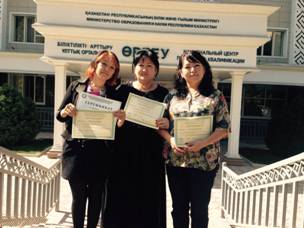
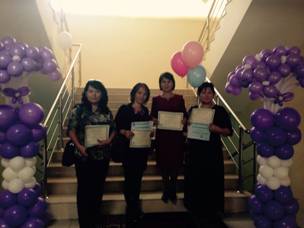
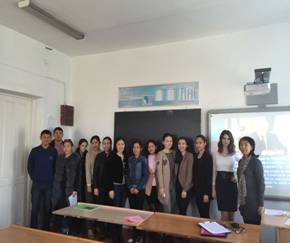
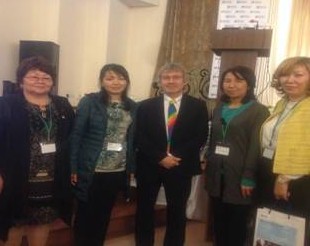
Acquisition of languages is power
In order to implement the policy of the trilingual education and improve the course of this work during the 2015-2016 school year, teachers of the department "Foreign languages for humanitarian specialties" actively participate in seminars and international conferences on current topics of polylinguism, techniques object-language integrated learning, etc.
The teaching staff Leaders of the Department supervises scientific projects of students on topics trilingualism, effective language learning with the result that the best research papers submitted for publication in the collections of the Republican student scientific conference.
As well as staff of the department has developed and published four-lingual branch terminology English-German-Russian-Kazakh dictionary, which the students of humanitarian specialties successfully used not only in the classroom but also in their research work on a specialty.
In addition, academic groups, teachers of the department conducted educational activities about the importance and necessity of owning three or more languages in the present conditions, the role of foreign languages in the life of an educated person.
It should be noted a special role of the head of "Foreign languages for humanitarian specialties" chair, PhD, A. N. Zhorabekova in the realization of the polilingual education idea in high educational department. Having defended successfully doctoral dissertation, she published more than 30 scientific and methodical works on multilingual education and thus made a significant contribution to the development of issues content foundation future teachers’ professional competence on the basis of polilingual approach.





